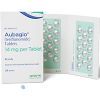Article
Aubagio Decelerates Multiple Sclerosis Flare-Ups
Author(s):
Approved by the FDA in September 2012, Genzyme's Aubagio (teriflunomide tablets) is a once-daily oral treatment shown to reduce relapses, slow physical disability progression and reduce the number of brain lesions detected by magnetic resonance imaging (MRI) in patients with relapsing forms of multiple sclerosis (MS).

Approved by the FDA in September 2012, Genzyme’s Aubagio (teriflunomide tablets) is a once-daily oral treatment shown to reduce relapses, slow physical disability progression and reduce the number of brain lesions detected by magnetic resonance imaging (MRI) in patients with relapsing forms of multiple sclerosis (MS), who make up 85 percent of the total MS population, according to the National MS Society.
Aaron E. Miller, MD, medical director of the Corinne Goldsmith Dickinson Center for MS at Mount Sinai Medical Center, in New York City, said in a press release many MS patients currently receive daily or weekly injectable treatments, so the oral Aubagio tablet is “an encouraging advancement for the MS community and may be a valuable treatment for people living with this often debilitating disease.”
Though MS develops differently in every patient — depending on the affected nerve fibers’ location — symptoms associated with its onset include numbness or weakness in limbs; partial or complete loss of central vision and optic neuritis; double vision or blurred vision; tingling or pain in various body parts; shock sensations paired with certain cranial movements; slurred speech; lost coordination; fatigue; and dizziness. For patients with relapsing-remitting MS, those symptoms may return — or new ones may crop up — over hours or days and last up to weeks or months.
Pharmacology and Pharmacokinetics
Aubagio’s full prescribing information notes teriflunomide is a de novo pyrimidine synthesis inhibitor, and though “the exact mechanism by which teriflunomide exerts its therapeutic effect in MS is unknown, it may involve a reduction in the number of activated lymphocytes” in the central nervous system.
After oral administration, teriflunomide is extensively bound to plasma protein and distributed in plasma, with peak concentrations typically reached between one and four hours.
Teriflunomide is primarily metabolized by hydrolysis, and it is mainly eliminated through biliary and renal excretion. Sixty percent of the dose is excreted via feces and urine over 21 days, though administration of 8 grams of cholestyramine every eight hours for 11 days or 50 grams of oral-activated charcoal powder every 12 hours for 11 days will accelerate that elimination period.
Dosage and Administration

Within six months of Aubagio dose initiation, health care providers should obtain a complete blood cell count and measure bilirubin and alanine aminotransaminase levels, which should be monitored on a monthly basis for six months after treatment commences. Potential Aubagio patients should also be screened for latent tuberculosis infection with a tuberculin skin test and get their blood pressure checked before treatment.
Aubagio is available in 7-milligram or 14-milligram teriflunomide tablets administered orally once daily either with or without food. The 7-milligram tablet is supplied as a very light greenish-bluish gray to pale greenish blue, hexagonal film-coated tablet with “7” imprinted on one side and Genzyme’s corporate logo engraved on the other, while the 14-milligram tablet is a pale blue to pastel blue, pentagonal film-coated tablet with “14” imprinted on one side and the corporate logo engraved on the other.
Clinical Trials
In a 108-week double-blind, placebo-controlled study, 1,088 patients with relapsing forms of MS were randomized to receive 7-milligram or 14-milligram daily doses of Aubagio or placebo. At the conclusion of the trial, the annualized relapse rate of patients treated with either Aubagio dosage strength was significantly lower compared to their placebo-treated counterparts, and patients in both teriflunomide-treated groups exhibited significantly smaller lesion volumes from baseline levels, based on several MRI variables. Additionally, physical disability progression measured by the Expanded Disability Status Scale was significantly reduced in patients who received 14-milligram Aubagio, compared to the placebo group.
Clinical studies did not establish the safety and effectiveness of Aubagio in the pediatric and geriatric populations.
Contraindications, Warnings and Precautions
As a result of reported drug-induced severe liver injury — including liver failure and dysfunction — in patients co-treated with lefluonomide for rheumatoid arthritis, administration of Aubagio with lefluonomide is contraindicated. Aubagio is also contraindicated in patients with severe hepatic impairment and women who are pregnant or of childbearing potential and not using reliable contraception, since teriflunomide may cause major birth defects.
Commonly reported adverse reactions to teriflunomide in ongoing clinical studies include headache, hair thinning, diarrhea, nausea and neutropenia. Risks for leflunomide that would also be expected during Aubagio treatment include hepatotoxicity, decreased white blood cell count, peripheral neuropathy, acute renal failure, hyperkalemia, increased blood pressure and occurance or worsening of interstitial lung disease.


